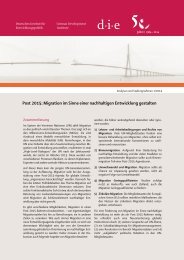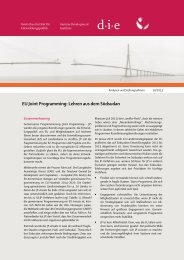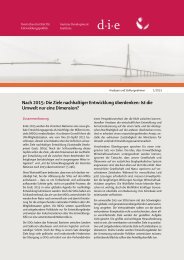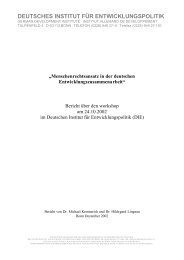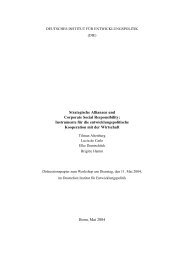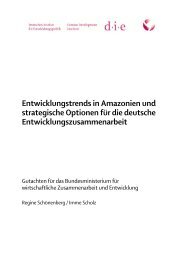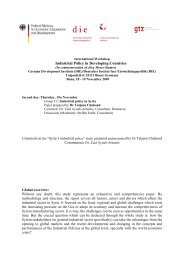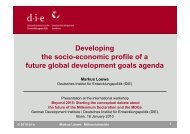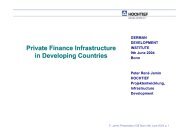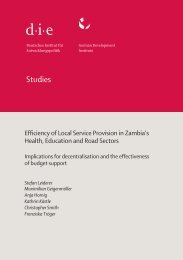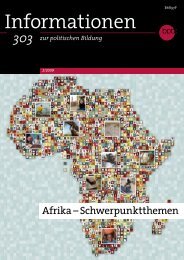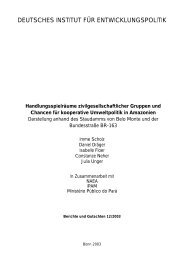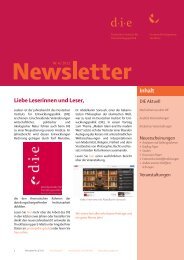Middle East / North Africa and the Millennium Development Goals ...
Middle East / North Africa and the Millennium Development Goals ...
Middle East / North Africa and the Millennium Development Goals ...
Create successful ePaper yourself
Turn your PDF publications into a flip-book with our unique Google optimized e-Paper software.
118<br />
Markus Loewe<br />
durable of 2003 nor <strong>the</strong> Plan d’Action National pour la nutrition of 1995<br />
have been implemented (UNDG 2002; GTZ / KfW 2005c).<br />
The case of Algeria is similar. Its 2001–2003 central development plan refers<br />
to all of <strong>the</strong> MDGs as important national goals. The country has made<br />
appreciable progress in its efforts to reform <strong>the</strong> education sector <strong>and</strong> increase<br />
school enrolment rates. On <strong>the</strong> o<strong>the</strong>r h<strong>and</strong>, <strong>the</strong> country has yet to reform<br />
its 1984 civil-status law, to implement a program designed to improve<br />
waste management, <strong>and</strong> to pass <strong>the</strong> legislation needed to translate<br />
international environmental conventions into national law. While <strong>the</strong><br />
country’s goods <strong>and</strong> factor markets have, formally, been opened <strong>and</strong> liberalized,<br />
informal structures continue to scare off both domestic <strong>and</strong> foreign<br />
investors. The procedures <strong>and</strong> decisions of administration <strong>and</strong> judiciary<br />
continue to be protracted, complicated, opaque, <strong>and</strong> hence have a clear-cut<br />
anti-business bias (GTZ / KfW 2005a; UN 2004a).<br />
5 Orientation of German development cooperation<br />
The 2004 German government report on <strong>the</strong> contribution provided by Germany<br />
to implementing <strong>the</strong> <strong>Millennium</strong> <strong>Development</strong> <strong>Goals</strong> states: “The<br />
MDGs <strong>and</strong> <strong>the</strong> <strong>Millennium</strong> Declaration constitute <strong>the</strong> binding orientation<br />
framework for German development policy.” (Bundesregierung 2004, 1).<br />
The German government, it goes on, provides “concrete measures designed<br />
to reach <strong>the</strong> MDGs in relevant countries, <strong>and</strong> it supports initiatives<br />
designed to improve <strong>the</strong> framework for development, as called for in<br />
<strong>the</strong> <strong>Millennium</strong> Declaration.” (Ibid: 1; emphasis in original). The report<br />
continues: “The joint international goals, including <strong>the</strong> MDGs, serve as a<br />
guideline for <strong>the</strong> BMZ’s medium-term policy formulation.” (Ibid: 3).<br />
In this chapter we will look into whe<strong>the</strong>r <strong>and</strong> to what extent <strong>the</strong> aims defined<br />
by <strong>the</strong> BMZ <strong>and</strong> <strong>the</strong> whole German government as a whole are reflected<br />
by <strong>the</strong> practice of Germany’s development cooperation (DC) with<br />
partner countries in <strong>the</strong> MENA region. We will focus successively on<br />
(i) <strong>the</strong> geographic <strong>and</strong> (ii) <strong>the</strong> sectoral orientation of German DC, (iii) <strong>the</strong><br />
measures supported by it within individual sectors, (iv) <strong>the</strong> political dialogue<br />
with partner governments, <strong>and</strong> (v) <strong>the</strong> progress made until today in<br />
implementing MDG8, for which <strong>the</strong> donors bear principal responsibility.<br />
German <strong>Development</strong> Institute



